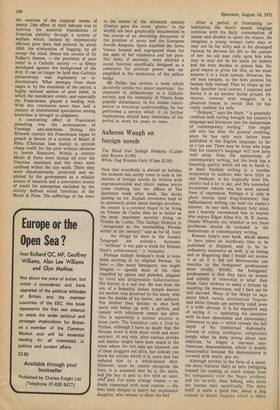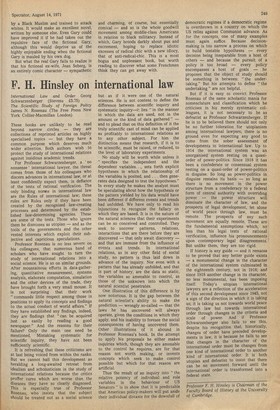Auberon Waugh on foreign novels
The Blind Owl Sadegh Hedayat (Calder and Boyars £1.60) White Dog Romain Gary (Cape £2.50) Now that everybody is abroad on holiday, the moment has surely come to look at the shelves of foreign novels by writers with unpronounceable and idiotic names which come crashing into the offices of The Spectator week after week, like ducks landing on ice. English reviewers tend to be extremely polite about foreign novelists. No sooner is a novelist found to be living on Tristan da Cunha than he is hailed as the most important novelist living on Tristan da Cunha. This Sadegh Hedayat is "recognized as the outstanding Persian writer of the century;" and as for M. Gary . . . the things he does to the Sunday Telegraph are nobody's business: " 'brilliant' is too pale a word for Romain Gary's achievement," it trumpets.
Perhaps Sadegh Hedayat's book is even more exciting in its original Persian. Its hero — like many foreigners, one might imagine — 'spends most of his time stupefied by opium and alchohol, plagued by vivid and disagreeable hallucinations. His history is a sad one. He was born the son of a beautiful Indian temple dancer; his mother was deceived by his uncle, who was the double of his father, and seduced. The mother then decides to shut both uncle and father up with a python, and remain with whichever comes out alive. This is apparently a normal solution in those parts. The translator calls it Trial by Python, although I have no doubt that the Persian word is both more vivid and more succinct. At any rate, after various shrieks and maniac laughs have been heard in the room where the two men are closeted, one of them staggers out alive, but nobody can know for certain which it is, since fear has reduced him to a white-haired idiot. However, since he cannot recognize the hero, it is assumed that he is the uncle, and the boy is sent to live with an aunt, whcr dies. For some strange reason — no doubt connected with local custom — the hero feels obliged to marry her unpleasant daughter, who refuses to share his bed. After a period of frustrating cohabitation, the hero's sexual longings combine with his daily consumption of opium and alcohol to upset his reason. He imagines a young woman (who may or may not be his wife) and in his deranged fantasy he devotes his life to the pursuit of her. An old man calls upon him who may or may not be his uncle (or father> and the hero decides to poison him. No good reason is given for this, so we must assume it is a local custom. However, the old man escapes, so the hero poisons his fantasy lady instead. Then he chops up her body (another local custom, I suppose) and buries it in an ancient burial ground. He returns, covered With maggots, in a phantom hearse, to reveal that he has really stabbed his wife.
"Hedayat," says the blurb, "is generally credited with having brought his country's language and literature into the mainstream of contemporary writing." One might ask who has done the general crediting, since he has only once before been published in the English language, so far as I can see. There may be those who hope that his country's language will now keep well away from the mainstream of contemporary writing, but the book has a haunting quality which led me to finish it, at least. Fantasy writing is a terrible temptation to authors who have little to say; Hedayat, in his tragically brief life, plainly had a lot to say, and this somewhat incoherent vehicle was his most natural form of expression. Perhaps it is only in ghost stories (and drug-literature) that hallucinatory writing can hold the reader's interest. At any rate, Hedayat held mine, and I heartily recommend him to anyone who enjoys Edgar Allan Poe, M. R. James, Dennis Wheatley etc, whether or not these gentlemen should be included in the mainstream of contemporary writing.
Romain Gray's new book, which seems to have taken an inordinate time to be published in England, and to be inordinately expensive as well, is so boring and so disgusting that I would not review it at all if it did not demonstrate one reaction to the foreigners'. predicament most vividly. Briefly, the foreigners' predicament is that they have no money and nobody is interested in what they think. Gary reckons to make a fortune by insulting the Americans, and I dare say he will succeed. Many of the things he says about black racists, professional Negroes and white liberals are perfectly valid, even if a trifle obvious. It is his repulsive way of saying it — spattering his narrative with he-man obscenities and unnecessary references to pus — which reveals the full depth of his intellectual dishonesty. Instead of telling intelligent, enlightened people what he feels wrong about race relations, he stages a one-man antiAmerican demonstration, which is doubly unsuccessful because the demonstrator is covered with warts, pus etc.
Although written in the form of a novel, the story features Gary as hero (whipping himself for making so much money from his compassion over the Negro problem) and his ex-wife, Jean Seberg, who loves the human race uncritically. The story itself is quite a good one, about a dog trained to attack Negroes which is taken by a Black Muslim and trained to attack whites. It would make an excellent novel, written by someone else. Even Gary could have improved it if he had taken out the repulsive face of the fictional Gary, although this would deprive us of the highly enjoyable ending when the fictional Gary is mauled by his own dog.
But what the real Gary fails to realize is that his fictional ex-wife, Jean Seberg, is an entirely comic character — sympathetic
and charming, of course, but essentially comical — and so is the whole goodwill movement among middle-class Americans in relation to black militancy. Instead of which, Gary broods darkly about pus and excrement, hoping to replace idiotic excesses of radical chic with a new idiocy, that of anti-radical-chic. This is a most bogus and unpleasant book, but worth reading to discover what some Frenchmen think they can get away with.



































 Previous page
Previous page